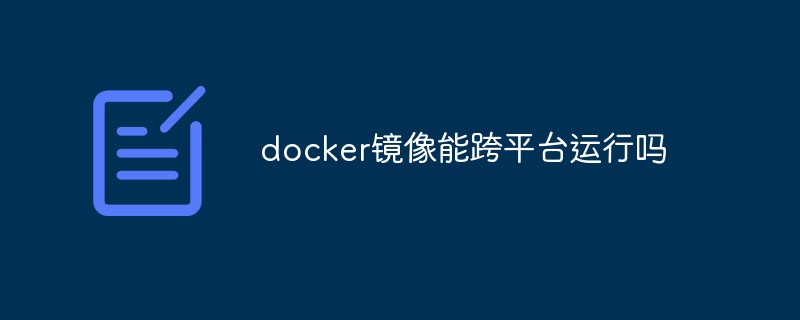
Docker images can run across platforms; as long as the system architecture is the same, the same image can be used. x86 images can only be used on x86 systems, and arm images can only be used on arm systems. Docker images are very important for containers. It just simulates an environment and has little to do with the host machine.

The operating environment of this tutorial: linux7.3 system, docker-1.13.1 version, Dell G3 computer.
Docker images have nothing to do with the operating system. The greatest value of docker is the image packaging technology. First of all, you understand what docker is, what an image is, and what a container is, and then you can understand the relationship between the image and the operating system. Docker is an engine and a technology based on the kernel. For example, if the Linux kernel is used, it cares whether it is a Linux kernel or not. It does not care whether you are Ubuntu or CentOS. Therefore, docker also achieves decoupling from the operating system. The image is to package the running environment of the service into a package, such as tomcat. In the image, in addition to the kernel of the operating system, the binary package of tomcat is added. Then build a tomcat image through the docker engine. As for containers, for example, if we want to create a tomcat service, the previous method was to install a tomcat in the server through tar or rpm, and then start tomcat; if we want to install multiple machines, we need to manually deploy them multiple times. Now that we have the tomcat image, we can directly use the image to create multiple tomcats (the relationship is that a tomcat image can create multiple tomcat containers - that is, tomcat services), and the containers can be regarded as tomcat processes.
A program needs the support of the operating system to run, and needs to access its own private data and software. Docker is a container that redirects all access to files and operating system APIs, making the application feel like it is running on an independent operating system. Docker intercepts API calls and redirects global access to the operating system. Wrapped so that programs don't actually access them. Because the docker program accesses the API of the container package, theoretically, as long as the API of these containers is implemented on another operating system, the program can be transplanted, because the program does not directly interact with the operating system and cannot sense the different systems. s difference.
Docker’s operating mechanism on various platforms
LINUX: Docker shares the kernel on Linux without virtualization and fully supports native functions. So only linux class docker can be created.
Windows: Docker is on Windows, enabling Hyper-V or virtualization technology (implemented through a virtual machine, without sharing the Windows kernel). Linux-like docker and Windows-like docker can be created.
Mac: Docker is also implemented on mac os using virtualization technology xhyve or virtualbox, and does not share the mac os kernel. Only Linux-like docker can be created, but Mac OSX docker cannot be created.
As long as the system architecture is the same, the same image can be used. For example, x86 images can only be used by x86 systems, and arm images can only be used by arm systems. The docker image only simulates an environment for the container and has little to do with the host machine
Recommended study: "docker video tutorial"
The above is the detailed content of Can docker images run cross-platform?. For more information, please follow other related articles on the PHP Chinese website!
 The difference between k8s and docker
The difference between k8s and docker
 What are the methods for docker to enter the container?
What are the methods for docker to enter the container?
 What should I do if the docker container cannot access the external network?
What should I do if the docker container cannot access the external network?
 What is the use of docker image?
What is the use of docker image?
 What are the differences between weblogic and tomcat
What are the differences between weblogic and tomcat
 The difference between nohup and &
The difference between nohup and &
 How to register for corporate Alipay
How to register for corporate Alipay
 What to do if Linux prompts No such file or directory when executing a file
What to do if Linux prompts No such file or directory when executing a file